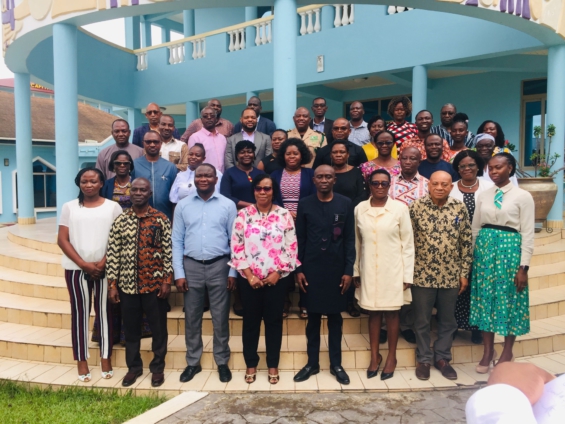The Food and Agriculture Organisation of the United Nations on Monday opened the first day of a three-day workshop to examine deficiencies in the One Health Country Profile and develop strategies for tackling these gaps.
It also intended to establish a revised version of the One Health Monitoring Tool within the framework and operational framework of the One Health Joint Plan of Action.
Dr. Kofi Afakye, National Coordinator of AMR at the Food and Agriculture Organisation (FAO), who spoke on behalf of Dr. Yurdi Yasmi, FAO Representative in Ghana, indicated that once the few setbacks had been resolved, the OH policy currently being implemented would be significantly advanced.
FAO's primary objective, according to him, was to devise OH approaches to address health problems caused by the interdependence of human health, animal health, and the shared environment.
This emphasis, he said, had prompted global bodies and organisations to adopt One Health as a solution to health problems.
Madam Stella Panwum, Director of Administration, Eastern Regional Coordinating Council, who spoke on behalf of the regional minister, Mr. Seth Acheampong, also said the rapid increase in the world's population had resulted in interactions between animal species and the zoonotic pathogens that pose global infectious disease threats.
She said antimicrobial Resistance (AMR) was a growing concern, necessitating One Health collaboration between the environment, plant and agricultural, animal, and public health sectors at the national and regional levels.
She added that ongoing efforts are being made to enhance the multi-sectoral collaboration programme, demonstrate the value of investment, and establish an innovative financing scheme for One Health.
Dr. Passoret Vounba, AMR Programme Officer of the World Organisation of Animal Health (WOAH), speaking on behalf of Dr. Karim Tounkara, Regional Representative of WOAH in Bamako, Mali, added that contemporary society is characterised by the rapid movement of people, goods, and pathogens.
He said emerging and re-emerging diseases at the interface of the human-animal-ecosystem were occurring more frequently in Africa, and that their occurrence was facilitated by biodiversity loss, land use change, and unsustainable agricultural production in addition to human, animal, and crop movement.
The COVID-19 pandemic, according to him, reaffirmed the need for an OH approach that recognised the interdependencies between the health of humans, animals, plants, and the environment.
He stressed that OH approach remained a priority for the quadripartite in the African continents, which consists of FAO, WHO, WOAH, and UNEP.
Mr. Patrick Avevor, an infectious hazard management officer who represents the World Health Organisation (WHO), said WHO was committed to institutionalising and strengthening OH operations in Ghana.
He explained that One Health Country Profile employed tools that integrate various aspects of OH policy, and that a more detailed explanation of the instrument would help in revealing the stage of OH implementation in Ghana.
"We have realised that several recommendations have been derived from the tool in the past, and action plans as well as road maps have been designed to foster the implementation phase."
Madam Ruth Arthur, Head of Disease Epidemics and Coordinator of the OH Technical Working Group, pointed out that zoonotic diseases that should have been in the forest were carried home because of human interactions with animals and the environment.
She explained that these zoonotic diseases demand expertise in human, animal, and environmental health to combat their outbreaks.
"You will need these sectors working together to have holistic approaches to responding to health emergencies," she said, explaining that the workshop was a follow-up to evaluate the OH strategies devised using the OH monitoring tools.
One Health is an integrated, unifying approach that aims to sustainably balance and optimise the health of people, animals, and the ecosystem.
Latest Stories
-
Burnley score late to draw with Manchester United at Old Trafford
52 mins -
Bayer Leverkusen extend unbeaten run to 46 games after draw with Stuttgart
55 mins -
Chelsea come from two goals down to draw against Aston Villa
60 mins -
Andre Ayew scores in Le Havre’s 3-3 draw with PSG
1 hour -
GPL 2023/24: Kotoko draw with Medeama; Samartex go 7 points clear of Nations FC
1 hour -
Mahama cuts sod for construction of new multipurpose Jakpa palace in Damongo
2 hours -
NSS management assists Papao fire victims
2 hours -
EXPLAINER: Will dumsor end soon?
3 hours -
IMANI Africa takes on EC, accuses it of lying and publishing half truths
4 hours -
Manasseh Azure calls for investigation and prosecution of those responsible for GRA/SML contract
4 hours -
Kwesi Atuahene: Ghana’s health capital depends on HealthTech – Africa Center for Digital Transformation
4 hours -
13 signs your wife is planning on leaving you and you have no idea
4 hours -
IMANI Africa: Ghana’s EC’s dangerous and pathological conduct
5 hours -
If I speak there will be fire – Salah on Klopp row
5 hours -
Grieving after divorce is normal, but this particular kind of grief isn’t
5 hours

